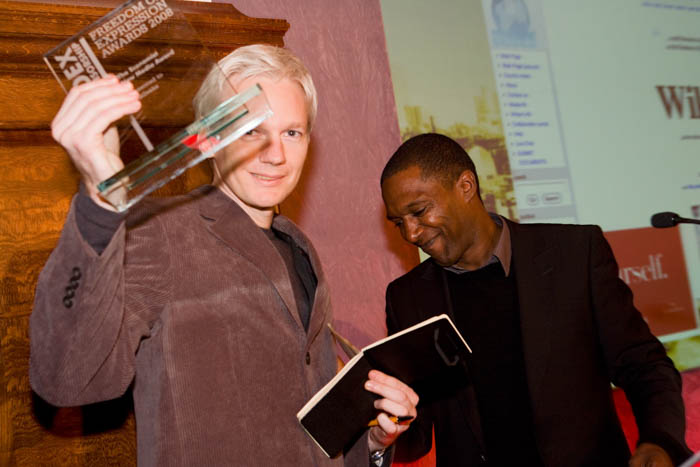[vc_row][vc_column][vc_column_text]
It has been over a decade since WikiLeaks released its cache of leaked documents and a little under a decade since it was awarded The Economist New Media Award at the 2008 Freedom of Expression Awards. In the following years, the non-profit organisation has published a considerable body of documents, holding to account states, corporations and individuals. Such actions would imply that it remains an apolitical organisation, whose mission is to ensure the defence of free speech and vitiation of censorship, although of late some would dispute its primary function. On the day of this year’s Dutch general election, WikiLeaks made separate Tweets with links to all documents referencing either Prime Minister Mark Rutte or right wing populist Geert Wilders.
Their fight for freedom of expression is often amorphous, which is well demonstrated by two publications from 2009. First, the March release of a website blacklist, proposed by Australia’s then communications minister, Stephen Conroy. Although it had been suggested by the Australian Government that the compulsory firewall would obstruct access to child pornography and sites related to terrorism, it was revealed to have included numerous websites which suggested a veiled political agenda. Second, the September release of an internal report on a toxic incident clean-up in the Ivory Coast by the oil trading company, Trafigura. That draft report was released after Trafigura obtained a super-injunction against The Guardian. Comparing the two, it is clear they share a commonality in combating instances of censorship, but beyond that an underlying characteristic in the material released is hard to find.
Where the organisation has had a focused, profound, and some would say not impartial, impact is on American politics. Three particularly notable moments were the 2010 Iraq and Afghanistan ‘War Logs’ and diplomatic cables associated with Chelsea Manning, the 2016 Democratic National Committee email leak, and the recent CIA Vault 7 release. It is perhaps the second of these that questions WikiLeaks’ apolitical position; in an interview with ITV, Julian Assange stated that he hoped the leaks would harm Hillary Clinton’s campaign. Certainly, the furore which surrounded Clinton’s use of a private email server in handling sensitive documents and the March 2016 release of her email archive was a boost for the Trump campaign. It remains to be seen whether the Trump administration or affiliated groups will be the subject of a WikiLeaks publication.
Whether one considers WikiLeaks a paragon, a zealot, or Machiavellian, it remains a powerful force against censorship. Although their profile has grown since being awarded The Economist New Media Award, they are still an organisation that appears wholly unconstrained by diplomatic pressures in holding bodies to account, who or whatever the target.
Samuel Rowe is a member of Index on Censorship’s Youth Advisory Board. He is currently a law conversion student at City, University of London, planning on practicing as a public law barrister with a focus in information law.[/vc_column_text][/vc_column][/vc_row][vc_row][vc_column width=”1/2″][vc_single_image image=”85476″ img_size=”full” alignment=”center” onclick=”custom_link” link=”https://www.indexoncensorship.org/2016/11/awards-2017/”][/vc_column][vc_column width=”1/2″][vc_column_text]
Index on Censorship Freedom of Expression Awards
Seventeen years of celebrating the courage and creativity of some of the world’s greatest journalists, artists, campaigners and digital activists
2001 | 2002 | 2003 | 2004 | 2005 | 2006 | 2007 | 2008 | 2009 | 2010 | 2011 | 2012 | 2013 | 2014 | 2015 | 2016 | 2017[/vc_column_text][/vc_column][/vc_row][vc_row][vc_column][vc_basic_grid post_type=”post” max_items=”12″ style=”load-more” items_per_page=”4″ element_width=”6″ grid_id=”vc_gid:1492506268361-b3958523-724a-7″ taxonomies=”273, 8935″][/vc_column][/vc_row]




